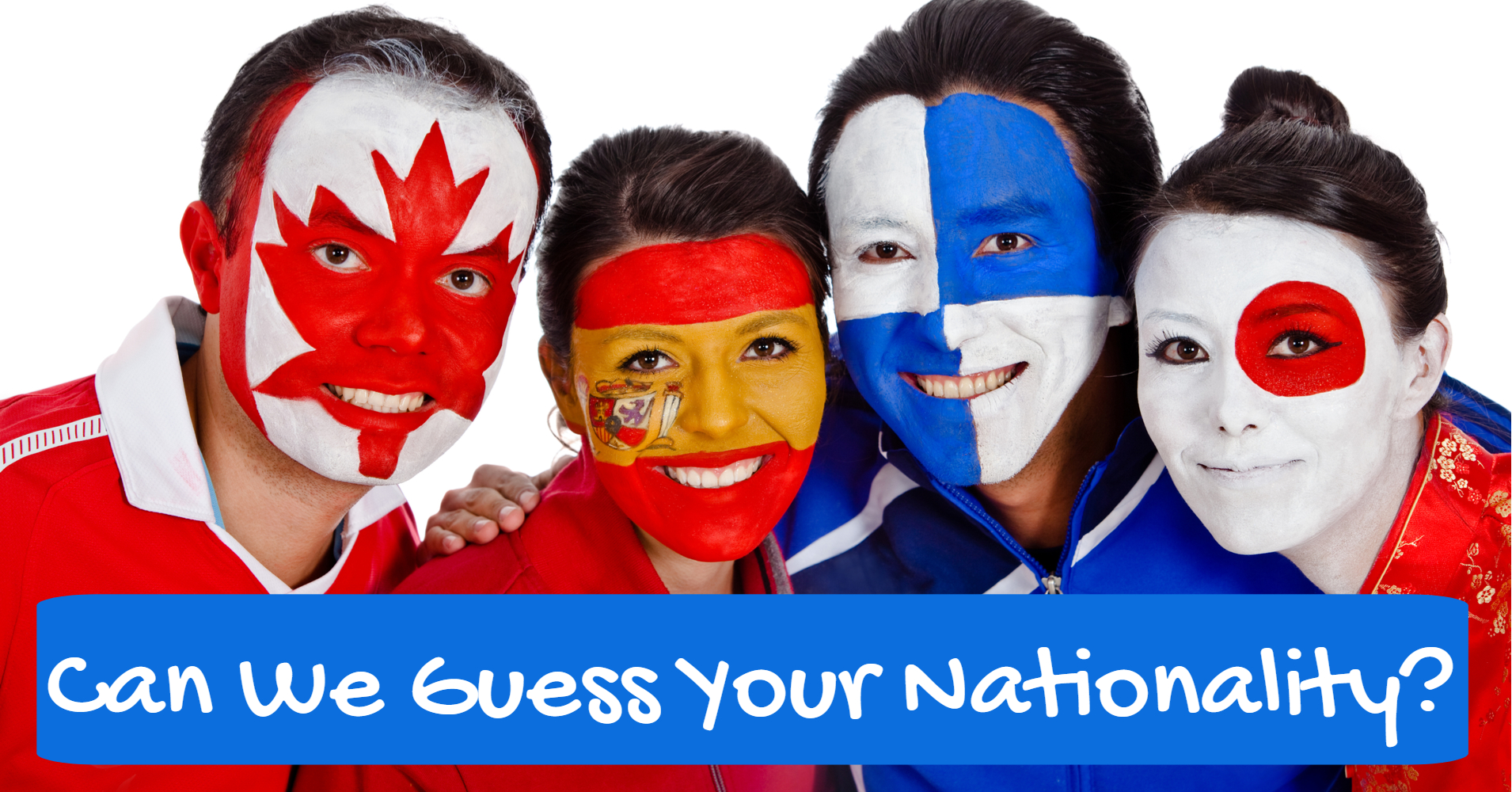Guess Nationality By Photo: Test Your Knowledge!
Can a photograph truly reveal where a person comes from? While facial features offer clues, the complex tapestry of human origins is far more intricate than what a single image can portray.
The allure of pinpointing someone's nationality based on their appearance is undeniable. We are, after all, a species fascinated by patterns and categorization. Our minds are wired to seek order in the chaos, and the prospect of quickly deciphering someone's background whether it be through a "guess the nationality" quiz or a face-scanning application holds a certain appeal. These tools, often presented as fun and educational games, tap into our innate curiosity about the world and its diverse peoples. They encourage us to consider how cultural habits and, yes, even specific appearances, might define a nation.
However, it's crucial to approach these tools with a healthy dose of skepticism. The notion that a photograph can definitively reveal someone's ethnicity or nationality is a simplification that often falls short of the truth. While certain physical traits may be more prevalent in specific populations, genetics are a complex interplay of ancestry. Many factors contribute to our appearance and our background, and no single photograph can give the whole story. Furthermore, to attempt to deduce someone's nationality on the basis of appearance can lead to harmful stereotyping.
Here is a sample table that can be inserted into a WordPress page:
| Feature | Description |
|---|---|
| Tool Name | Nationality Guesser |
| Type | Quiz Game |
| Primary Function | To identify the nationality of people based on images of their faces. |
| Educational Value | Enhances knowledge of geography, cultures, and ethnicities from around the world. |
| Key Features | Provides a fun and engaging way to learn and improve understanding of diverse cultures. |
| Accuracy | Relies on facial recognition, which may not always be accurate due to complexity of human features and ethnic diversity. |
| Additional Features | _description_ _result_share_incentive_ can share more games, offers face analysis. |
| Reference | Example Website - Example.com |
The digital landscape is populated with applications and tools designed to perform this very task. These range from simple quiz games to sophisticated algorithms that claim to analyze facial features and provide an "educated guess" about a person's ethnicity. Some offer the ability to upload a photo or type in a description, while others boast face cutout tools that let users superimpose their own image onto a person of a different nationality, often to explore various looks or to gain a new perspective. Some of these apps use artificial intelligence to "guess" a person's heritage, and they often provide an estimated percentage of origin.
One such application, "Myface," touts itself as a free android application that uses a neural network to identify nationality by analyzing a face. Users can find their estimated nationality percentage with just a few taps. Others, like the "guess the Asian test" quiz, focus on a specific region, presenting pictures of people from various Asian countries and testing the user's ability to identify their nationalities. There are even tools that use advanced face analysis and promise DNA analysis in an easy and fun way.
However, it's important to note the limitations of these technologies. While they can be entertaining and even educational in some instances, they are not foolproof. They are, at best, educated guesses based on visual patterns. The complexity of human ancestry means these tools have a high probability of getting it wrong.
As the English dictionary would define it, 'ethnicity' is an ethnic quality or affiliation resulting from racial or cultural ties. The word is used frequently in the English language. Nationality, on the other hand, denotes a legal and political status a person's citizenship. Ethnicity, therefore, is a broader concept than nationality. The former is often more subjective and relates to a sense of belonging, while the latter is objective.
The development of "guess the nationality" quizzes and face analysis tools can also offer insights into diverse cultures and notable individuals. It can enhance cultural appreciation and understanding. They can also provide a starting point for learning more about different ethnicities and countries. However, one must remember that these should be used only to give a basic overview of peoples from different backgrounds, and further research will be required to give an accurate and proper understanding. They should never be used as a definitive indicator of a person's heritage, as the results can be inaccurate and misleading.
One must be wary of the claims made by some apps. There are apps that may promise they can tell your ethnicity based on looks from a photo, but it is not possible for it to be accurate. The apps may say it, but a photo ethnicity analyzer cannot guess where your ancestors were from.
The concept of "what race do I look like?" is another area where caution is advised. Today, a photo ethnicity analyzer might use AI to analyze your face and guess your ethnic heritage. There are several photo ethnicity analyzers available, but the accuracy will vary.
The ability to identify someone's ethnicity based on their appearance is not a straightforward task. This is due to the complexity of human genetics. Traits like hair texture, eye color, and skin tone are determined by multiple genes, and these can vary across different populations and within the same family. Therefore, a person's physical appearance cannot always tell the whole story of their background.
Furthermore, the concept of race itself is a social construct, and racial categories can vary across different cultures and time periods. The categories used by these tools are often broad and may not accurately reflect a person's complex ancestry.
When evaluating these tools, consider the methodology used. Some tools rely on algorithms that are trained on large datasets of facial images. The accuracy of these algorithms depends on the quality and diversity of the training data. If the training data is biased, the algorithm may produce inaccurate results for people from underrepresented groups.
Another important aspect of understanding is the concept of cultural appropriation. It is an area where caution is advised. Cultural appropriation occurs when members of a dominant culture adopt elements of a minority culture without understanding or respecting their original context. The use of face analysis tools can contribute to cultural appropriation if they reduce people's identities to superficial stereotypes.
In conclusion, while it may be tempting to use these tools to guess someone's nationality or ethnicity based on their appearance, it's important to approach them with a critical eye. These tools are often based on flawed assumptions and may not accurately reflect a person's complex ancestry. The human experience is too varied to be categorized so easily, and a photograph can never tell the whole story.
The pursuit of understanding the world's cultures is a noble endeavor, but it demands respect, nuanced thinking, and a willingness to learn beyond surface appearances. Let us embrace curiosity and seek to understand one another with an appreciation for the rich diversity of human heritage, recognizing that nationality is a complex blend of history, culture, and individual identity.


![[Face analysis] Can We Guess The Nationality Of Your Features?](https://survley.com/assets/img/image/nation-11.png)